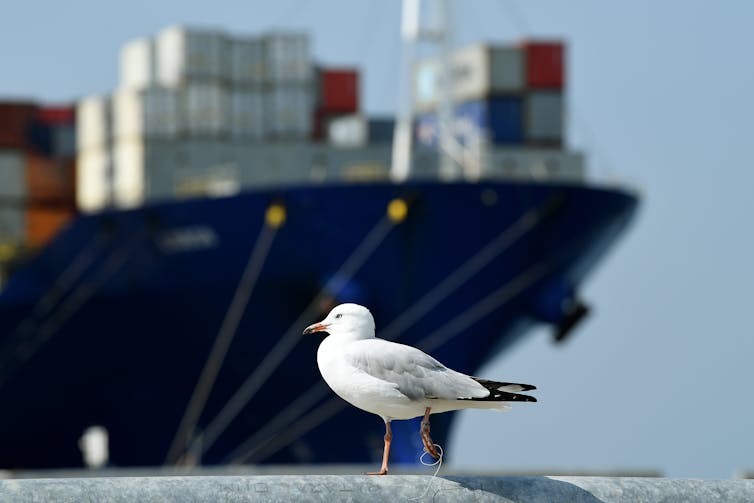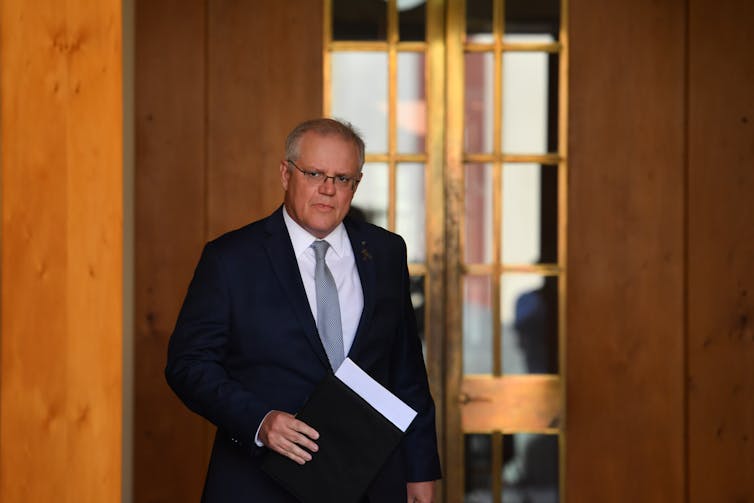What is the latest waterfront dispute about?
- Written by The Conversation
Twenty-two years ago, images of balaclava-clad security guards[1] with German shepherds, locking out wharfies[2] at the Patrick container terminals shocked the nation.
With a fresh industrial dispute underway[3] at the Patrick container terminals, are we on track for another war on the waterfront? And what will this mean for medication and food supplies?
What is this dispute about?
Patrick Terminals is one of Australia’s biggest container terminal operators.
About seven months ago[4], Patrick and the Maritime Union of Australia (MUA) started negotiations over a new nationwide enterprise agreement, which expired on June 30.
 Negotiations between Patrick and the Maritime Union of Australia have been going for months. Joel Carrett/AAP
Negotiations between Patrick and the Maritime Union of Australia have been going for months. Joel Carrett/AAP
The dispute centres around a wage increase, improved rostering arrangements, minimising casualisation of the workforce and increased superannuation contributions. The union initially asked for a 6% annual pay increase[5] but is now negotiating for 2.5%.
Unhappy with the progress of negotiations, the wharfies voted in late August[6] to take protected action against the company, including 24-hour strikes, stop-work meetings and bans on overtime. Patrick says this severely limits its ability[7] to run the business, including efficiently to service ships, trucks and trains.
Normally, negotiations would run over a longer period before industrial action would be taken. But given recent industrial action with another container stevedore[8], DP World, (which has now ceased[9]), the effect of the delays built up quickly and Patrick went to the Fair Work Commission (FWC).
What’s at stake?
Patrick has warned more than 100,000 containers[10] face delays if the partial work bans continue into next week.
“The delays are real,” Patrick chief executive Michael Jovicic told Radio National[11] on Wednesday.
Read more: Is global shipping in the doldrums?[12]
Patrick says ships face lengthy delays to find a berth[13] in Port Botany. Or they are being diverted to other ports, which has seen additional expenses for importers and exporters.
The cost to run a ship can amount to A$25,000 per day[14]. In an effort to recoup the costs they incur in having to wait at sea for a berth, shipping lines have instigated so-called “port congestion charges” of up to US$350 per container[15] (A$492).
On top of incurring delays to their cargo, importers and exporters also have to absorb these additional costs.
Supply chains, already under pressure due to COVID-19, will come under more strain if the dispute is not resolved quickly. If it drags on much longer, cargo will bank up further and it will become harder to catch up in time to get imported goods on shelves before Christmas.
This could result in additional costs for imported goods, as well as shortages leading up to the usually busy festive period. Exporters will also lose out if they cannot get their goods overseas.
Strong words
The situation has now reached fever pitch. On Tuesday, Prime Minister Scott Morrison [16] described the union behaviour as “appalling”. As he told reporters[17],
we cannot have the militant end of the union movement effectively engaging in a campaign of extortion against the Australian people in the middle of a COVID-19 recession.
 Prime Minister Scott Morrison has accused the unions of ‘extortion’. Mick Tsikas/AAP
Prime Minister Scott Morrison has accused the unions of ‘extortion’. Mick Tsikas/AAP
The National Farmers’ Federation says[18] the dispute is threatening the sector’s recovery from the drought and COVID-19, while the Australian Industry Group[19] has raised concerns about the flow of white goods, construction supplies and food manufacturing.
There have also been concerns medical supplies [20] could be delayed. The union has rejected these claims[21], while Medicines Australia[22] says there are no current shortages.
The MUA’s national secretary Paddy Crumlin, meanwhile, says talk of huge delays is “fake news[23]”. He says Patrick[24] is trying to
slash the conditions of their workforce under the cover of the COVID crisis.
All key parties are highlighting their own interests — using examples to suit their case and try and resonate with the public.
Will it be resolved?
On Wednesday, Patrick and the MUA went to the FWC for a conciliation[25] hearing.
Ahead of this, the union offered a peace deal[26]. It proposed the existing workplace agreement is rolled over for 12 months in return for a 2.5% pay rise and both parties to negotiate in good faith during the next 12 months.
As of 6pm on Wednesday, the hearing - which started at 10am - was still going. There is a further FWC hearing scheduled for Thursday to try to settle the dispute.
Remember the history
We need to heed the lessons of 1998. As the infamous waterfront dispute [27] dragged on, more parties were affected and became involved, resulting in long, drawn out legal arguments in the courts.
Read more: Morrison wants unions and business to 'put down the weapons' on IR. But real reform will not be easy.[28]
It’s time for cool heads to prevail. Inflammatory language from parties not directly involved in the dispute will do nothing to ensure a negotiated outcome.
References
- ^ balaclava-clad security guards (www.abc.net.au)
- ^ locking out wharfies (www.aph.gov.au)
- ^ industrial dispute underway (www.smh.com.au)
- ^ seven months ago (www.theguardian.com)
- ^ 6% annual pay increase (www.theguardian.com)
- ^ voted in late August (www.afr.com)
- ^ limits its ability (www.theguardian.com)
- ^ another container stevedore (www.afr.com)
- ^ which has now ceased (www.portstrategy.com)
- ^ more than 100,000 containers (www.afr.com)
- ^ told Radio National (www.abc.net.au)
- ^ Is global shipping in the doldrums? (theconversation.com)
- ^ find a berth (www.theguardian.com)
- ^ A$25,000 per day (www.9news.com.au)
- ^ US$350 per container (sila.net.au)
- ^ Prime Minister Scott Morrison (www.theguardian.com)
- ^ told reporters (www.pm.gov.au)
- ^ National Farmers’ Federation says (www.canberratimes.com.au)
- ^ Australian Industry Group (www.afr.com)
- ^ medical supplies (www.smh.com.au)
- ^ rejected these claims (thenewdaily.com.au)
- ^ Medicines Australia (www.abc.net.au)
- ^ fake news (www.abc.net.au)
- ^ says Patrick (www.theguardian.com)
- ^ conciliation (www.fwc.gov.au)
- ^ peace deal (www.theguardian.com)
- ^ waterfront dispute (www.smh.com.au)
- ^ Morrison wants unions and business to 'put down the weapons' on IR. But real reform will not be easy. (theconversation.com)
Read more https://theconversation.com/explainer-what-is-the-latest-waterfront-dispute-about-147100

















